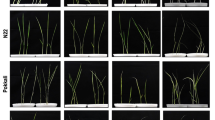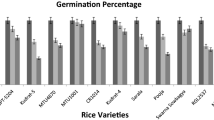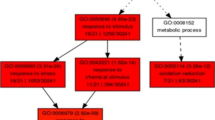Abstract
Rice production in recent years is highly affected by rapidly increasing temperatures in the tropical and sub-tropical countries, which threatens the sustainable production in near future. Hence, understanding the heat tolerance mechanism and evolving tolerant varieties is an immense need in the staple crop rice. An experiment has been conducted to identify differentially expressed genes in rice under heat stress conditions by employing a diverse set of 32 rice genotypes that includes reported heat tolerant genotypes Nagina 22 (N22) and Dular. Screening of the genotypes at field conditions during Summer-2018 for reproductive stage heat tolerance (wherein the mean minimum (29.8 °C) and maximum (38.4 °C) temperatures surpassed optimum temperatures (25 °C night/30 °C day) required for rice flowering and grain filling stages) and lab conditions employing thermal induction response (TIR) technique to know the genotype’s acquired thermal tolerance revealed that the genotype FR13A (indica landrace) showed highest overall performance for multitude of traits viz., 95.29% of spikelet fertility (SF-%) at field level and 100% seedling survival percentage (SSP) at sub-lethal temperatures under laboratory conditions. The relative performance (under TIR) across all the three traits viz., relative shoot length (RSL) (4.91), relative root length (RRL) (equal to the control) and relative seedling dry weight (RSDW) (6.94) over control is high when compared to the other genotypes under study. However, the highly susceptible genotype PUSA1121 performed with 43.59 of SF%, 73.33% SSP, − 43.59 of RSL, − 36.02 of RRL over control. Hence, these contrasting genotypes were used for molecular analysis for identification of differentially expressed genes by employing 29 heat related gene specific primers. Five genes viz., OsGSK1, TT1, HSP70-OsEnS-45, OsHSP74.8 and OsHSP70 have shown differential expression between the two genotypes. Hence, the genotype FR13A, an ‘indica’ genotype, can be utilized in heat tolerance breeding programmes as donor parent in addition to the reported ‘aus’ genotypes, N22 and Dular. To our knowledge this is the first indica genotype identified for heat tolerance. The HSP70s, TT1 and OsGSK1 that proved with differential expression might be used for identification of gene specific InDels and thereby to develop functional markers that help in the marker assisted introgression breeding to develop heat tolerant varieties that can sustain production under dramatically changing climatic conditions.


Similar content being viewed by others
References
Ali F, Waters DLE, Ovenden B, Bundock P, Carolyn A, Raymond T, J, and Rose. (2018) Australian rice varieties vary in grain yield response to heat stress during reproductive and grain filling stages. J Agro Crop Sci 2018:1–9
Arpitha SB (2017) Selective line genotyping for identification of markers associated with heat tolerance in rice (Oryza Sativa L.). MSC. (Ag) Thesis submitted to ANGRAU.
Arshad MS, Farooq M, Asch F, Krishna JSV, Prasad PVV, Siddique KHM (2017) Thermal stress impacts reproductive development and grain yield in rice. Plant Physiol Biochem 115:57–72
Beena R, Vighneswaran V, Narayankutty MC (2018) Evaluation of rice genotypes for acquired thermo-tolerance using temperature induction response (TIR) technique. Oryza 55(2):285–291
Cao YY, Duan H, Yang LN, Wang ZQ, Liu LJ, Yang JC (2011) Effect of high temperature during heading and early filling on grain yield and physiological characteristics in indica rice. Acta Agron Sin 35:512–521
Das P, Lakra N, Nutan KK, Pareek SLS, Pareek A (2019) A unique bZIP transcription factor imparting multiple stress tolerance in Rice. Rice 12:58
Goswami A, Banerjee R, Raha S (2010) Mechanisms of plant adaptation/memory in rice seedlings under arsenic and heat stress: expression of heat-shock protein gene HSP70. AoB PLANTS 2010:plq023
Gui-lian Z, Li-yun C, Shun-tang Z, Hua Z, Guo-hua L (2009) Effects of high temperature stress on microscopic and ultrastructural characteristics of mesophyll cells in flag leaves of rice. Rice Sci 16(1):65–71
Harihar S, Srividhya S, Vijayalakshmi C, Boominathan P (2014) Temperature induction response technique—a physiological approach to identify thermotolerant genotypes in rice. Int J Agric Sci 10:230–232
Hasanuzzaman M, Nahar K, Alam M, Roychowdhury R, Fujita M (2013) Physiological, biochemical, and molecular mechanisms of heat stress tolerance in plants. Int J Mol Sci 14(5):9643–9684
Hemantaranjan A, Nishant Bhanu A, Singh MN, Yadav DK, Patel PK, Singh R, Katiyaret E (2014) Heat stress responses and thermotolerance. Plants Agric Res 1(3):62–70
Henning LM, Pegoraro C, Maia LC, Venske E, Rombaldi CV, Olieviera A (2015) Expression profile of rice Hsp genes under anoxic stress. Genet Mol Res. https://doi.org/10.4238/gmr.15027954
Hikosaka K, Ishikawa K, Borjigidai A, Muller O, Onoda Y (2006) Temperature acclimation of photosynthesis: mechanisms involved in the changes in temperature dependence of photosynthetic rate. J Exp Bot 57:291–302
Huang B, Xu C (2008) Identification and characterization of proteins associated with plant tolerance to heat stress. J Integr Plant Biol 50(10):1230–1237
Jagadish SVK, Muthurajan R, Oane R, Wheeler TR, Heuer S, Bennett J, Craufurd PQ (2008) Physiological and proteomic approaches to dissect reproductive stage heat tolerance in rice (Oryza sativa L.). J Exp Bot 61:143–156
Jain M, Nijhawan A, Tyagi AK, Khurana JP (2006) Validation of housekeeping genes as internal control for studying gene expression in rice by quantitative real-time PCR. Biochem Biophys Res Commun 345:646–651
John JB (2001) Identification of genetic diversity and mutations in higher plant acquired thermo tolerance. Int J Plant Biol 112(2):167–170
Koh S, Lee S, Kim M, Koh J, Lee S, An G, Choe S, Kim S (2007) T-DNA tagged knockout mutation of rice OsGSK1, an orthologue of Arabidopsis BIN2, with enhanced tolerance to various abiotic stresses. Plant Mol Biol 2007(65):453–466
Kumar M, Kumar G, Srikanthbabu V, Udayakumar M (2006) Assessment of variability in acquired thermotolerance: potential option to study genotypic response and the relevance of stress genes. J Plant Physiol 164:111–125
Kumar N, Nitin K, Shukla A, Shankhdhar SC, Shankhdhar D (2015) Impact of terminal heat stress on pollen viability and yield attributes of rice (Oryza sativa L.). Cereal Res Commun 43(4):616–626
Li XM, Chao DY, Wu Y, Lin HX (2015) Natural alleles of a proteasome α2 subunit gene contribute to thermotolerance and adaptation of African rice. Nat Genet. https://doi.org/10.1038/ng.3305
MacRae. (2007) Extraction of plant RNA. Methods Mol Biol 353:15–24
Maestri E, Klueva N, Perrotta C, Gulli M, Nguyen HT, Marmiroli N (2015) Molecular genetics of heat tolerance and heat shock proteins in cereals. Plant Mol Biol 48:667–681
Masuduzzaman ASM, Ahmad HU, Haque M, Ahmed MME (2016) Evaluation of rice lines tolerant to heat during flowering stage. J Rice Res 4:170
Nakagawa, H., Horie, T and Matsui, T. 2003. Effects of climate change on rice production and adaptive technologies. In rice science: innovations and impact for livelihood. In: Proceedings of the IRR Conference, Beijing, China, 16–19 September 2002 (Edt by T. W. Mew, D. S. Brar, S. Peng, D. Dawe & B. Hardy), Manila, Philippines: IRRI. 635–658 pp.
Neelam KS, Preeti K, Anil G (2012) Functional analysis of Hsp70 superfamily proteins of rice (Oryza sativa). Cell Stress Chaperones 18(4):427–437
Prasad PVV, Boote KJ, Allen LH, Sheehy JE, Thomas JMG (2006) Species, ecotype and cultivar differences in spikelet fertility and harvest index of rice in response to high temperature stress. Field Crops Res 95:408–411
Shah F, Huang J, Cui K, Nie L, Shah T, Chen C, Wang K (2011) Impact of high-temperature stress on rice plant and its traits related to tolerance. J Agric Sci 149:545–556
Sudhakar P, Latha P, Ramesh babu P, Sujatha K, Raja Reddy K (2012) Identification of thermotolerant rice genotypes at seedling stage using TIR technique in pursuit of global warming. Indian J Plant Physiol 27:185–188
USDA World Agricultural Production (2019) https://www.fas.usda.gov/data/world-agricultural-production
Vijayalakshmi D, Srividhya S, Vivitha P, Ravindran M (2015) Temperature induction response (TIR) as a rapid screening protocol to dissect the genetic variability in acquired thermotolerance in rice and to identify novel donors for high temperature stress tolerance. Indian J Plant Physiol 20:368–374
Wahid A, Gelani S, Ashraf M, Foolad MR (2007) Heat tolerance in plants: an overview. Environ Exp Bot 61:199–223
Wassmann R, Jagadish K, Sumfleth H, Pathak G, Howell A, Ismail R, Serraj E, Redona RK, Singh RK, Heuer S (2009) Regional vulnerability of climate change impacts on Asian rice production and scope for adaptation. Adv Agron 102:2009
Xie XJ, Shen SHH, Li YX, Zhao XY, Li BB, Xu DF (2011) Effect of photosynthetic characteristics and dry matter accumulation of rice under high temperature at heading stage. Afr J Agric Res 6(7):1931–1940
Zhang Y, Tang Q, Peng S, Zou Y, Chen S, Shi W, Qin J, Laza CR (2013) Effects of high night temperature on yield and agronomic traits of irrigated rice under field chamber system condition. Aust J Crop Sci 7(1):7–13
Zafar SA, Hameed A, Khan AS, Ashraf M (2017) Heat shock induced morpho-physiological response in indica rice (Oryza sativa L.) at early seedling stage. Pak J Bot 49(2):453–463
Zafar SA, Zaidi SS, Gaba Y, Pareek SN, Dhankher PO, Li X, Mansoor S, Pareek A (2020) Engineering abiotic stress tolerance via CRISPR-Cas mediated genome editing. J Exp Bot 71:470–479
Acknowledgements
This research was supported by the Department of Biotechnology, Institute of Frontier Technology, Regional Agricultural Research Station, ANGRAU, Tirupati, A.P. We thank S.V. Agricultural College, Tirupati, ANGRAU for providing the field screening facility.
Author information
Authors and Affiliations
Contributions
SVA planned the experiments. MMSW executed the experiments and recorded the phenotypic data and genotypic data. SVA and MMSW analyzed the data. LP and SP provided the required facility for laboratory screening. SVA and MMSW wrote the manuscript. All authors read and approved the final manuscript.
Corresponding author
Ethics declarations
Conflict of interest
The authors declare that they have no conflict of interest.
Additional information
Publisher's Note
Springer Nature remains neutral with regard to jurisdictional claims in published maps and institutional affiliations.
Electronic supplementary material
Below is the link to the electronic supplementary material.
Rights and permissions
About this article
Cite this article
Wahab, M.M.S., Akkareddy, S., Shanthi, P. et al. Identification of differentially expressed genes under heat stress conditions in rice (Oryza sativa L.). Mol Biol Rep 47, 1935–1948 (2020). https://doi.org/10.1007/s11033-020-05291-z
Received:
Accepted:
Published:
Issue Date:
DOI: https://doi.org/10.1007/s11033-020-05291-z




